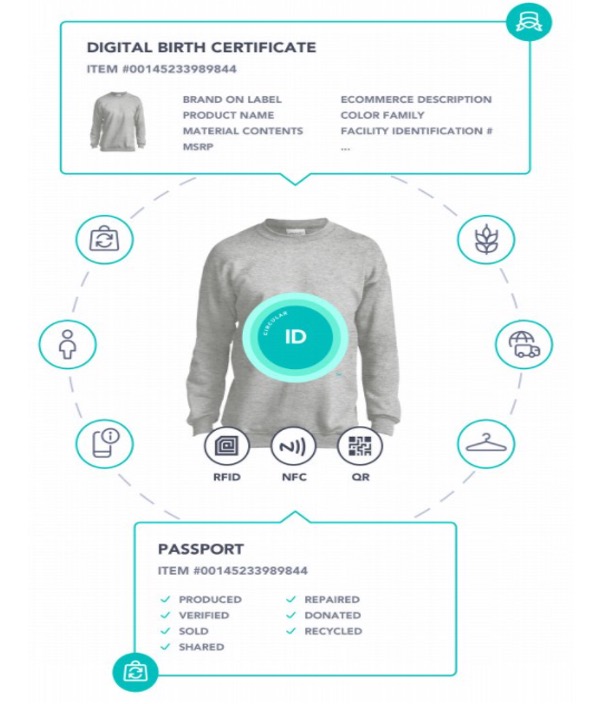Next Step of Transparency, Product Passports
Product passports, which follow the concept of transparency, are the next great step. The fashion industry has been criticized for its lack of transparency, excessive resource use, and rising role in the global waste crisis. Since transparency is so critical in the sustainability journey, brands are turning to technology to store, track, and communicate product information. Consumers may quickly understand who created the item, where it was made, what materials it was made from, and so on by scanning the product tag using QR codes. These codes reflect the whole story of the garment in the hands of the customer, so boost consumer trust as well. It also supports in the increasing secondhand market by allowing users to check validity and past owners.

These “product passports” use a combination of technologies centered on blockchain and supported by RFID, QR codes, and NFC to link information that is important to both customers and partners to particular items. These technologies are assisting firms in recognizing and addressing industry issues such as counterfeiting and the need for more ethical and transparent business operations in the face of increased consumer concern about climate change and labor conditions in the fashion industry.
Businesses must cooperate around common standards and invest in large-scale pilot projects for “product passports” to achieve popularity.
Technology-based product passports are one way to store and transparently share information about a product’s sustainability characteristics. Details on the product’s materials (giving a more detailed and durable record than typical sewn-on labels), where and how it was created, and the working conditions at the manufacturer might all be included in this information.
Consumers usually remove labels from their clothing, thereby disconnecting the garment from its legally mandated fiber content, identification, care, and origin information for the rest of its life. Product passports would reduce the probability of this information being separated from a product.
The new CircularID ™ Protocol, established by top fashion brands, retailers, and other stakeholders across the value chain under the umbrella of Eon, a connected goods technology firm, is one of the most important projects at the center of this change.

This will provide a common language for brands to communicate across the lifecycle about fashion products. To support data sharing across the circular value chain, Eon will make the CircularID Protocol open and available to the industry. While the first focus will be on fashion, clothes, and retail, it is possible that this may grow to include other industries such as furniture, textiles, and home products in the future.
To boost the digitization of value chain and product information data, such as digital product passports, the European Commission is developing a shared European Dataspace for Smart Circular Applications. This type of new government policy has a significant impact on the usage of product passports
Fashion companies and retailers including Net-a-Porter and H&M, as well as textile producers and resellers like Reflaunt, Save Your Wardrobe, and the Salvation Army Trading Company, have collaborated with Eon. A physical tag with a QR code or an RFID chip is attached to each item that is logged on the platform.
TS Designs is using QR-enabled passports to validate US-made clothes, while Reformation has worked with blockchain platform FibreTrace to give customers with QR codes to access lifetime information on denim garments.
Companies including LVMH and Prada launched the Aura Blockchain Consortium in spring 2021, a shared private platform that uses unique codes to authenticate product records that include ownership history, authenticity data, and material provenance.
From a marketing perspective, product passports will benefit players who can expand their capabilities across several use cases.
To sum up, passport technology will reinforce customer trust, generate exclusivity, encourage repurchase, and allow more sustainable and ethical behaviors.


